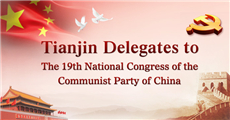In China, the world's largest auto market, industry news breaks out every day: record-breaking sales, history-making moments, far-reaching policies and outrageous scandals. Below are China Daily's motoring editors' picks for the top 10 moments that shook or shaped China's auto industry in 2016.
Car sales hit new high, see double-digit growth
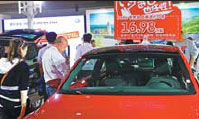
Imported cars attract visitors at the Zhengzhou auto show on April 15, 2016.Sha Lang/China Daily
China is estimated to have sold 28 million cars this year, securing a double-digit growth rate. Statistics from the China Association of Automobile Manufacturers show nearly 25 million vehicles were sold from January to November, surging 14.1 percent from the same period last year. Xu Haidong, an assistant to the CAAM's secretary-general, estimated that around 3 million would be sold in December, and the whole year's growth rate would reach around 13 percent. The organization had estimated the growth rate for the year at around 6 percent.
Policy lifts ban on cross-province trade
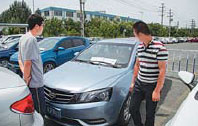
Customers look at vehicles at a used car auction in Jilin on July 15, 2016. Zhu Wanchang/China Daily
China released an eight-article guideline on March 25 demanding that cities outside the Beijing-Tianjin-Hebei, Yangtze River Delta and Pearl River Delta regions lift their bans on used cars being imported from other regions by May 31. The ban, which was in place in about 300 cities, has long been seen as a major obstacle to trading in used cars. However, the ban has not been removed in some cities until this year. Experts scaled back their original estimate of 2016 used car sales to 10 million from 11 million units. A total of 9.4 million used cars were sold in 2015.
SAIC GM fined $28.9 million for price-fixing
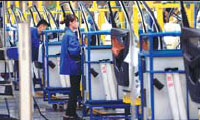
Workers assemble car doors at a SAIC GM factory. Liu Chengyin/China Daily
SAIC GM became the latest automaker punished for price-fixing when the National Development and Reform Commission imposed a 201 million yuan ($28.9 million) fine on them on Dec 16. The fine equals about 4 percent of the joint venture's sales in China last year. SAIC GM is one of the best-selling automakers in China, selling 1.67 million cars in the first 11 months of 2016, ranking second only to SAIC Volkswagen and FAW-Volkswagen. The commission has issued fines on automakers including Audi and Chrysler totaling 2.25 billion yuan since 2014.
Audi AG partnership spurs dealers' dispute
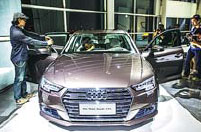
The All New Audi A4L is introduced to the market on Sept 12, 2016 in Shanghai. Liu Jiahao/China Daily
German carmaker Audi AG signed a deal on Nov 11 to produce and sell cars with China's SAIC Motor, angering dealers of its joint venture with FAW, fearing for their business interests. The dealers, who were not informed of the cooperation in advance, even threatened to stop taking in cars if Audi could not give them a satisfactory answer on how to protect their profits. After several rounds of lengthy and difficult negotiations, Audi finally agreed to suspend talks with SAIC about building a new sales network until the current dealers see stable profitability. Yet their talks on providing Audi cars continue and the first Audi model to be produced at SAIC Volkswagen is scheduled to be showcased in April.
E-car roadmap outlines 15-year plan for sector
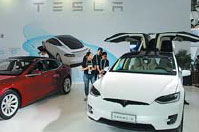
Customers learn about electric cars in Nanjing, Jiangsu province. Wang Qiming/China Daily
The Ministry of Industry and Information Technology released a 15-year roadmap in October on new energy cars, outlining the sector's development goals to be reached by 2030. According to the blueprint, such cars will account for 7 percent of total car sales in 2020 and 40 percent in 2030, reaching an estimated 15.2 million units. The blueprint set a target for electric cars to run 300 kilometers on a single charge by 2020 and 500 km by 2030.
Record number of recalls over defects
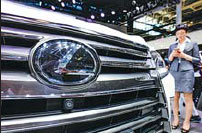
Toyota China decided to recall nearly 20,000 Lexus cars in May 2016. Shi Guofeng/China Daily
Chinese and international automakers issued recalls for a record 11.33 million faulty cars in China in 2016, according to the country's top quality watchdog. The number of cars recalled more than doubled year-on-year, exceeding the 10 million mark for the first time in a single year since China introduced its car recall mechanism in 2004, said the General Administration of Quality Supervision, Inspection and Quarantine. The quality watchdog prompted more than 75 percent of recalls this year, involving roughly 8.51 million cars. Airbags and safety belts caused the recall of 6.43 million cars. Engine problems resulted in 2.42 million cars being recalled and faulty car bodies in 852,900 vehicles recalled.
Tax cut for small engines to prevent hard landing
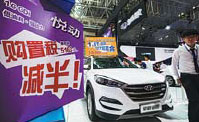
An advertisement for the purchase tax discount is displayed at an auto show in Fuzhou in 2015. Chen Hao/China Daily
Authorities decided on Dec 15 to give a 25 percent purchase tax discount for those buying cars with engines no larger than 1.6 liters before 2018. Analysts believe the move will save the auto market from a hard landing in the new year. The purchase tax usually stands at 10 percent of a car's sticker price. To boost stagnant car sales, the authorities introduced a measure in late September 2015 to halve the tax for small cars, which expired on Dec 31, 2016.
Five subsidy swindlers exposed and punished
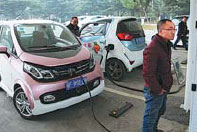
An electric car owner charges his car in Xiangyang, Hubei province. Yang Dong/China Daily
Five new energy vehicle producers that swindled subsidies from the central government were exposed in September following an investigation of 90 such manufacturers beginning in early 2016. The five companies - Suzhou Gemsea, Higer Bus, Wuzhoulong Motors, Mychery Bus and Shaolin Bus - illegally obtained a total of 1.01 billion yuan ($145.9 million) in subsidies in 2015 and claimed to have sold 3,547 vehicles that were actually either unfinished or unsold. The Ministry of Finance said the five companies are to return the illegally obtained subsidies, and punished and disqualified them for subsidies after 2016. Gemsea, which had the most severe violations, has been removed from the country's list of automakers. The authorities have raised the threshold for automakers to receive subsidies and demanded that subsidies from local governments not exceed 50 percent of those from the central government.
VW joins JAC for third joint venture in China
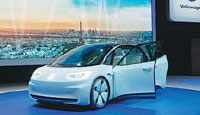
The Volkswagen I.D. electric concept car is displayed at the 2016 Paris auto show. Huang Zheng/China Daily
German automaker Volkswagen signed a memorandum of understanding with Jianghuai Automobile in September to set up a 50:50 joint venture for new energy vehicles. The two have entered into discussions to evaluate the prospects and feasibility of a company focusing on research, manufacturing and sales of new energy vehicles and spare parts. They aim to sign a formal agreement on their partnership by February. The move will make VW the first international automaker to have three passenger car partners in China, the two existing ventures being FAW-Volkswagen and SAIC Volkswagen.
Stricter ride-hailing laws restrict driver eligibility
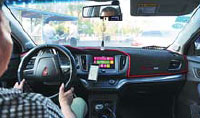
A driver uses a car-hailing app on his smartphone. Wang Zhengwei/China Daily
Transport authorities in Beijing and Shanghai introduced draconian rules on car-hailing services in December, demanding that drivers from car-hailing platforms such as Didi Chuxing have local household registration, vehicles have local license plates and meet a minimum size requirement, essentially disqualifying all compact cars. An official from the Beijing transport authorities said the standards, which are higher than those for taxis, are designed to differentiate the services.
(China Daily 01/09/2017 page19)
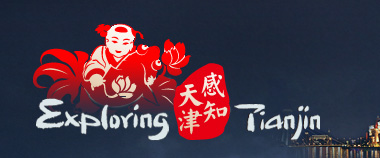
 Business
Business
